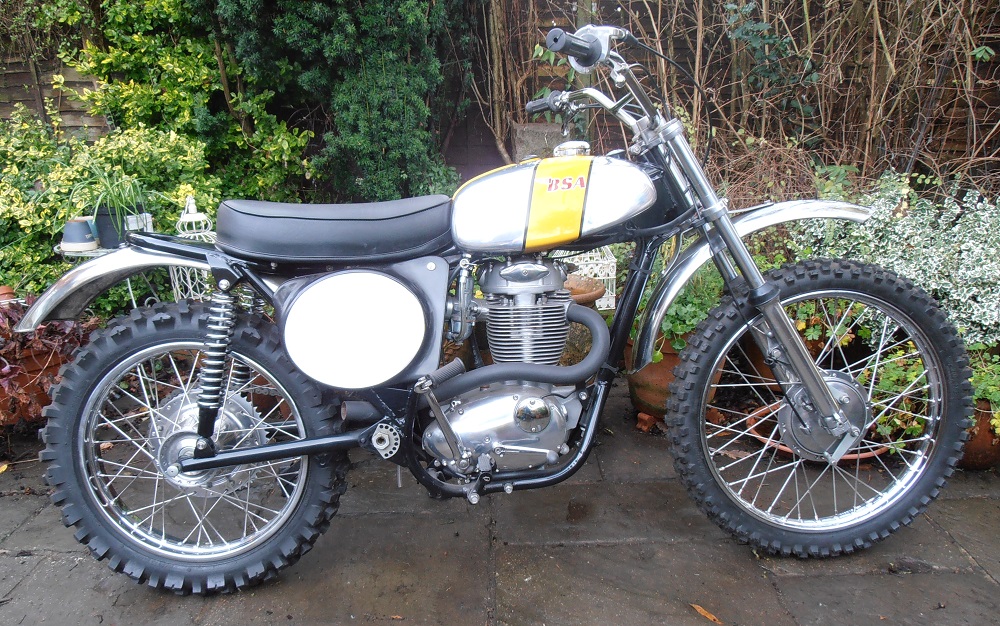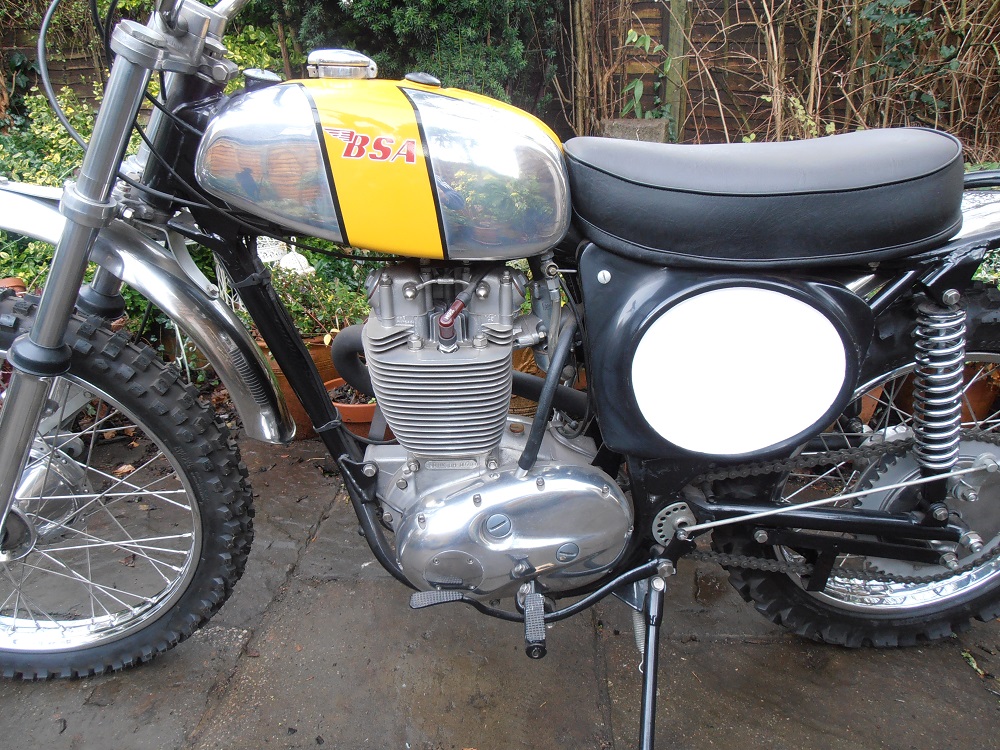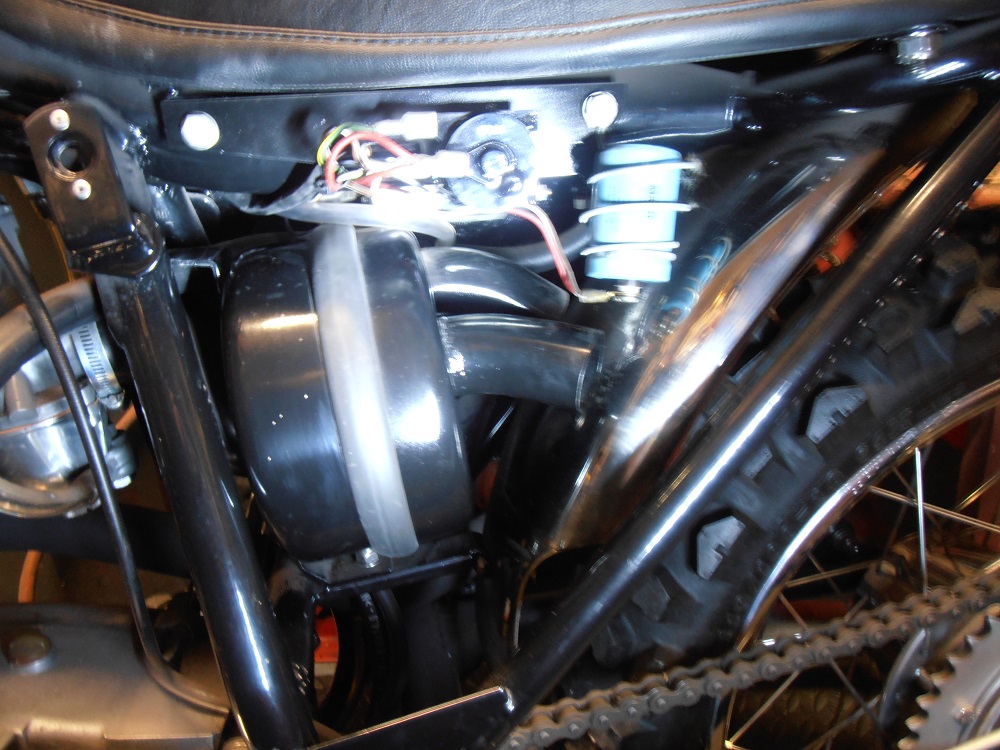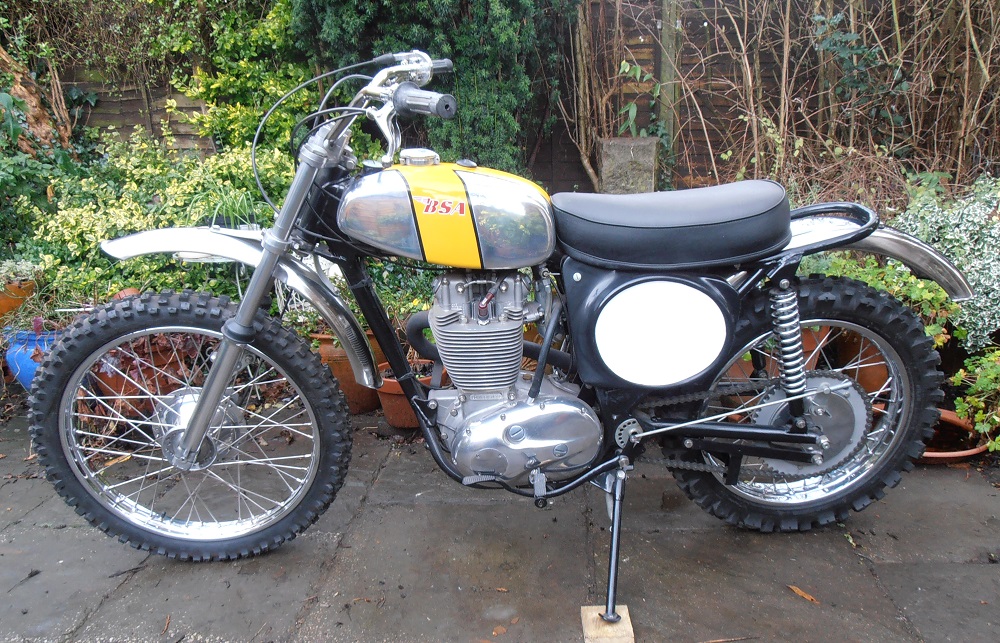The history and main features of the B50 range of BSA motorcycles is described on my B50T page. The B50MX was produced by BSA between 1971 and 1973, principally, for off-road competition use although with limited success. Unsold B50MX’s were later re-badged in 1974 as Triumph TR5MX Avengers after the demise of the BSA Group.
The B50MX was designed purely for off-road use and was basically a pared back version of the road going models using the same frame, wheels and suspension. The cream frame colour of the road models was ditched and a more conventional gloss black paint finish used for the B50MX together with bare stainless steel mudguards. It used a much narrower version of the aluminium petrol tank from the B50T with capacity reduced from 2 to 1 gallon. It also used a shorter saddle suitable with off-road competition use.
The B50MX used a simplified electrical system without lights or indicators and providing an ignition system similar to the road going bikes but without the use of a battery. The components employed consisted of a rectifier, condenser, capacitor, Zener diode and ignition coil which are all mounted on a plate on the left-hand side under the saddle. The added benefit of this electrical system is that it avoided the need for the electric box used on the other two models and greatly improved the look of the bike as a result. The B50MX is a great looking bike, is relatively light in weight at 109 kg and produces almost 30 Nm of torque. It was let down in competition use by its frame and suspension system which were not really strong enough for off-road use.
My B50MX Restoration
Although my B50MX was in working order when I bought it, it was given a full nuts and bolt restoration. Unfortunately, the frame was in a very poor state when I got it having suffered significant damage during its past off-road usage and the swinging arm had been heavily modified to strengthen it. In order to return the B50MX to original factory specification, I had to acquire a replacement B50 frame and swinging arm. Unfortunately, both the frame and swinging arm had to be fully straightened first and then the brackets on the frame not used by the B50MX ground off, such as, the brackets for the battery carrier and electrics box.


 The B50 engine was completely rebuilt with new bearings and seals throughout. The cylinder was re-bored with a new piston and the valves and springs were all replaced and the seats recut. The cylinder head, barrel and crankcases were all vapour blasted to clean them. The engine cases were then re-polished after removing all the scratches and damage using an electric sander and suitable grades of paper.
The B50 engine was completely rebuilt with new bearings and seals throughout. The cylinder was re-bored with a new piston and the valves and springs were all replaced and the seats recut. The cylinder head, barrel and crankcases were all vapour blasted to clean them. The engine cases were then re-polished after removing all the scratches and damage using an electric sander and suitable grades of paper.
The frame was powder coated in gloss black and then the aluminium petrol tank painted as per factory standard in the same shade of yellow used on the B44 Victor Special. My B50MX actually came with the tank off a Triumph TR5MX which is similar but with more rounded corners. I did not want to fit the correct 1 gallon tank for the B50MX because this is impractical for normal use being excessively narrow. Instead I acquired a replacement 2 gallon tank and then sent this off to Motorcycle Dent Removal in Pickering to have the small number of dents removed. Since this tank was off a B25T, I also had to get the company to re-position the two petrol tap bosses backwards a few centimetres to clear the B50 inlet rocker cover. As usual, the company did a perfect job of the work.
As with my B50T, the two wheels were completely rebuilt using stainless rims and spoke. New wheel bearings were fitted and the conical hubs were polished rather than being painted as was the case when the bike left the BSA factory. The steering head and swinging arm bearings and seals were all replaced and all control cables were replaced by new items. Again, the fork stanchions were replaced along with the lower leg seals and rubber scrapers. The lower legs were polished rather than leaving them in the original rough casting finish.
The most challenging part of my B50MX restoration was replacing the missing trumpet air filter box. This consists of a front circular enclosure bolted to the frame via a top and bottom racket, and then connected via a plastic hose to the carburettor. Inside this enclosure is mounted a B50 circular paper air filter. The end cover is bolted to the air filter enclosure and has three inlet pipes directed down and to either side just in front of the rear mudguard. Unfortunately, these air filter boxes are as rare as hen’s teeth probably having been thrown away early in the bike’s life and replaced with something a bit more sensible. I could not find an original one and therefore fabricated an authentic one from scratch. The picture below shows the air filter box along with the mounting plate for the main electrical components under the seat.

BSA B50MX Specifications
- Engine: Single cylinder, OHV, 2-valve, 4-stroke
- Starting: Kickstart only
- Capacity: 499 cc
- Bore/Stroke: 84 x 90 mm
- Compression Ratio: 10:1
- Max Power: 34 bhp
- Carburettor: AMAL 932 carburettor
- Cooling: Air cooled
- Lubrication: Dry sump
- Ignition: Coil and contact breaker points
- Transmission: 4 speed foot shift
- Final Drive: Chain
- Front Suspension: Coil spring and hydraulically damped
- Rear Suspension: Coil spring and hydraulically damped
- Front Brake: 6 inch drum single leading shoe
- Rear Brake: 7 inch drum single leading shoe
- Frame: Oil-in-Frame (OIF)
- Wheel Base: 54 inch
- Seat Height: 32 inch
- Front Tyre: 3.00 x 20 inch
- Rear Tyre: 4 x 18 inch
- Ground Clearance: 7.5 inch
- Dry Weight: 109 kg
- Fuel Tank: Aluminium 1 gallon
- Oil Tank: 4.75 pints
BSA B50 Parts Suppliers
Some B50 spare parts are relatively easy to get hold of with many good suppliers easily found on the internet. Two of the larger suppliers of BSA parts are Burton Bike Bits and Dragonfly Motorcycles.
11,642 total views, 5 views today


